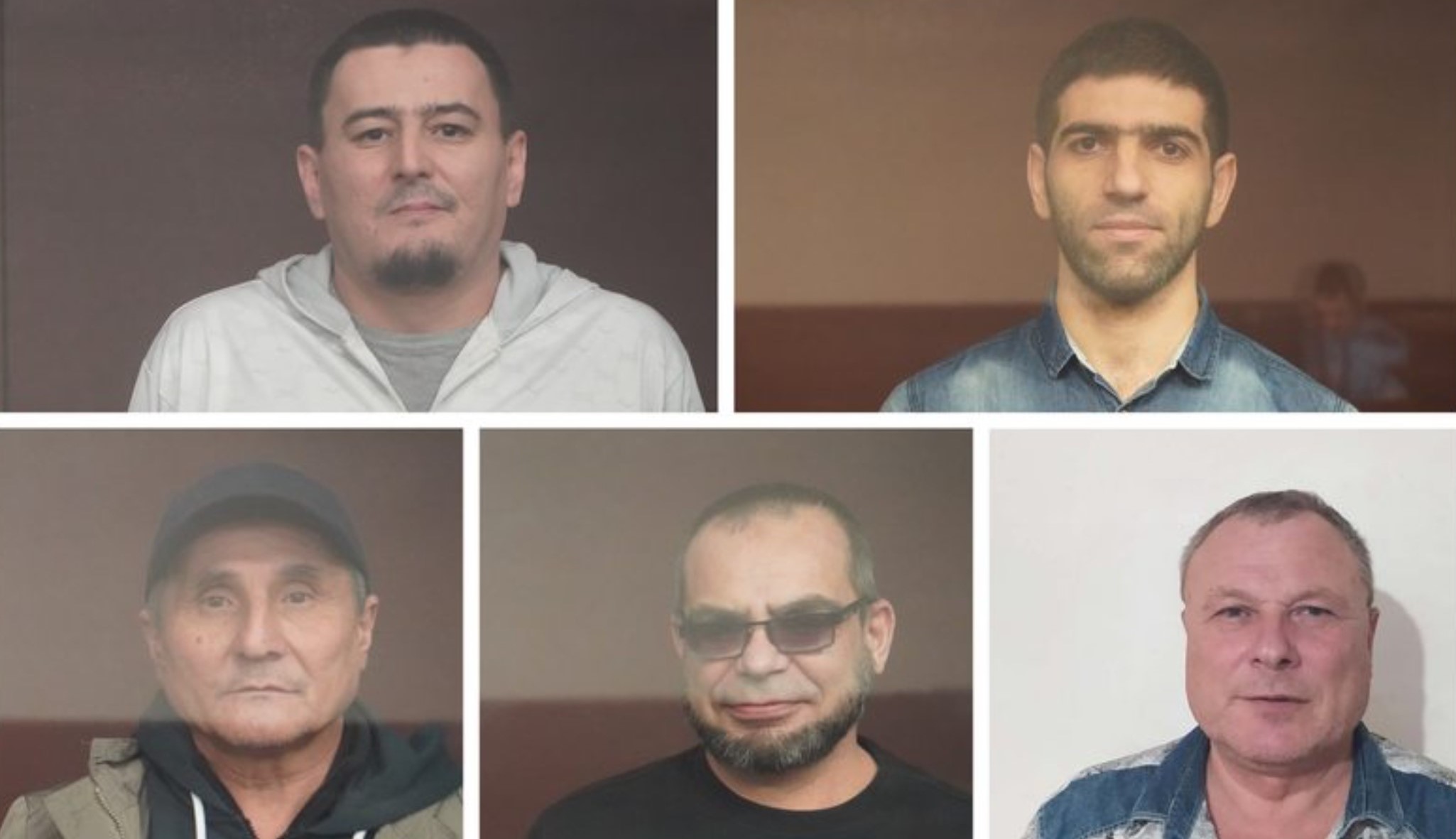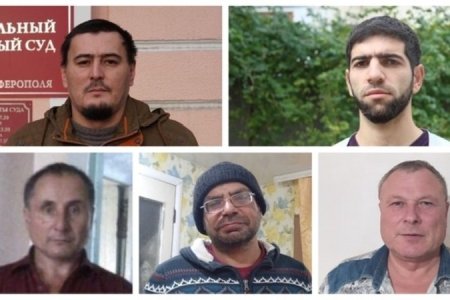
Russia’s notorious Southern District Military Court has passed 13-19-year sentences against five Crimean Tatar political prisoners arrested on 11 August 2022 on charges based on a conversation about prayer in 2015. The fact that the sentences were even greater than those demanded only strengthens the suspicion that the men were seized in revenge for a successful Ukrainian strike on a Russian airbase in occupied Crimea the day before. With Russia denying the attack had even happened, its FSB stepped in, arresting men over a conversation 7 years earlier, while claiming that “a terrorist cell controlled from Ukraine had been eliminated”. No major effort was, after all, required, with the FSB having been initiating conveyor-belt arrests and ‘trials’ of men who have committed no crime on flawed ‘terrorism’ charges since 2015. As in essentially all such cases since 2017, the charges were also evidently aimed at imprisoning yet another journalist from the vital Crimean Solidarity human rights initiative, Vilen Temerianov, as well as civic activists like Enver Krosh.
In this ‘trial’, as in all others, Russia used a flawed and highly secretive supreme court ruling from February 2003 which declared Hizb ut-Tahrir, a peaceful, although controversial, transnational Muslim organization, ‘terrorist’. Hizb ut-Tahrir is legal in Ukraine and is not known to have committed acts of terrorism anywhere. The ruling, moreover, directly clashes with Russia’s 2006 law on countering terrorism, yet it has been used since 2015 to sentence Crimean Muslims to up to 20 years, with the FSB increasingly using it as a weapon of persecution against Crimean Tatar civic journalists and activists from Crimean Solidarity.
In this case, civic activist Enver Krosh (b. 1991) was designated as the supposed ‘organizer’ of an unproven Hizb ut-Tahrir group under Article 205.5 § 1 of Russia’s criminal code. Crimean Solidarity civic journalist Vilen Temerianov (b. 1985); Seitiaha Abbozov (b. 1957); Rinat Aliev (b. 1964); Edem Bekirov (b. 1976) were accused of ‘involvement’ in this supposed group, under Article 205.5 § 2. In occupied Crimea. Although the armed men who burst into family homes on 11 August 2022 never pretended to be ‘searching’ for anything except ‘prohibited religious literature’, all of the men also faced the no less preposterous charge of ‘planning to violently seize power’, under Article 278.
The outcome of all such ‘trials’ is tragically clear from the moment of arrest, however the men and their lawyers continue to demonstrate the lack of any substance to the charges and the manner in which ‘evidence’ is fabricated. In this case, the alleged ‘evidence’ included ‘religious literature’ which the FSB brought with them and then claimed to have ‘found’ in places where no devout Muslim will keep such books. There was also a conversation about prayer, illicitly taped in 2015. Although the FSB had clearly sat on this for seven years, they then used an FSB-loyal ‘expert’ to write an assessment echoing the indictment about involvement in a ‘terrorist organization’. The same was true of the ‘secret witnesses’ whom the FSB, as always, used. Not only did presiding ‘judge’ Timur Khabasovich Mashukov ignore the defence’s legitimate objections to witnesses whose testimony could not be verified, but he blocked defence questions aimed at demonstrating that these alleged witnesses were lying.
It was clear back on 5 June 2025 that huge sentences were being demanded against all of the men, including 68-year-old Seitiaha Abbozov whose state of health made him one of very few political prisoners to be held under house arrest, rather than in detention.
The sentences passed on 26 November by ‘judges’ Timur Khabasovich Mashukov, together with Sergei Gorelov and Edward Korobenko were in three cases worse than those demanded by the prosecutor. All sentences were for three or four years in a prison, the worst of Russian penal institutions, followed by long terms in a maximum-security prison colony, likely to be many thousands of kilometres from the men’s homes and families. The sentences were:
Enver Krosh - 19 years, with the first four in a prison (two years longer than earlier demanded);
Rinat Aliev and Edem Bekirov – 15 years, with three years in a prison;
Vilen Temerianov – 14 years, with three years in a prison (one year longer than the prosecutor demanded);
Seitiaha Abbozov – 13 years, with the first three in a prison, with this two years more than demanded by the prosecutor. Abbozov was taken into custody in the occupation military ‘court’ following the sentence. This is despite the fact that for the elderly Crimean Tatar this is likely to be death sentence, one that only comes into force if (or, unfortunately, when) upheld by a Russian appeal court.
No attempt was ever made to accuse the men of any recognizable crime, with the indictment filled with claims about ‘conspiratorial meetings’ at which the men allegedly gained ‘special knowledge and campaigning techniques’, etc.
The men are all from Dzhankoi or the area, and all are recognized by Ukrainian human rights organizations and the Memorial Support for Political Prisoners Project as political prisoners.
Enver Krosh is a civic activist who was subjected to an attempt by the FSB to recruit him and to torture by electric shocks, in December 2015. Such ‘recruitment’ is aimed at obtaining false testimony, including the above-mentioned ‘secret witnesses’.
Vilen Temerianov, a Crimean Solidarity civic journalist had already faced detention and administrative prosecution (fines and administrative arrest) for totally peaceful civic activism. He was earlier subjected to one armed search, with the enforcement bodies removing computer and other technology, as well as letters to political prisoners facing the same charges that the FSB now brought against the Crimean Solidarity journalist.. Vilen and his wife Elmaz have three children, including 9-year-old Khalid who has a grave heart condition.


